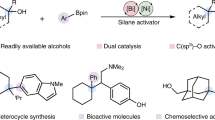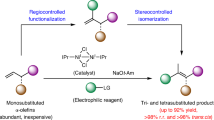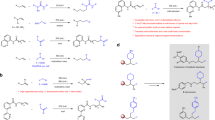Abstract
A procedure for the stereoselective synthesis of substituted alkenes from α-silyl aldehydes, via the Peterson reaction, is described. The protocol for the preparation of α-silyl aldehydes is also included. Organometallic addition to the α-silyl aldehyde gives erythro-β-hydroxysilanes in high yields (85–90%), which undergo elimination on treatment with potassium hydride (KH) or boron trifluoride to afford respectively Z- o E-alkenes (87–90%). The method described has been carried out using α-silyl aldehydes bearing the tert-butyldiphenylsilyl group. This bulky group increases the stability of the silyl aldehyde, enhances the stereoselectivity of the formation of the β-hydroxysilanes and favors the stereocontrol of the elimination step, thus providing high yields of stereo-defined alkenes. Here we describe a two-step protocol for the synthesis of Z-1-phenyl-1-hexene from 2-tert-butyldiphenylsilyl-2-phenylethanal and n-butyllithium, followed by elimination of the resulting (1S*,2R*)-1-tert-butyldiphenylsilyl-1-phenylhexan-2-ol with KH. The total time for the synthesis, purification and isolation of the alkene is 2 days.
This is a preview of subscription content, access via your institution
Access options
Subscribe to this journal
Receive 12 print issues and online access
$259.00 per year
only $21.58 per issue
Buy this article
- Purchase on Springer Link
- Instant access to full article PDF
Prices may be subject to local taxes which are calculated during checkout



Similar content being viewed by others
References
Colvin, E.W. Silicon Reagents in Organic Synthesis (Academic Press, London, 1988).
Birkefer, I. & Stuhl, O. in The Chemistry of Organic Silicon Compounds (eds. Patai, S. & Rappoport, Z.) 663–676 (Wiley, Chichester, UK, 1989).
Fleming, I. in Comprehensive Organic Synthesis Vol. 2 (eds. Trost, B.M. & Fleming, I.) 563–593 (Pergamon, Oxford, UK, 1991).
Davies, A.G. in Comprehensive Organometallic Chemistry II Vol. 2, 217 (Pergamon Press, New York, 1995).
Fleming, I. in Science of Synthesis: Houben–Weyl Methods of Molecular Transformations Vol. 4 (Thieme, Stuttgart Gr., 2001).
Auner, N. & Weis, J. Organosilicon Chemistry (Wiley-VCH, Weinheim Gr, 2003).
Weber, W.P. Silicon Reagents for Organic Synthesis (Springer-Verlag, New York, 1983).
Ager, D.J. The Peterson reaction. Synthesis 384–398 (1984).
Peterson, D.J. A carbonyl olefination reaction using silyl-substituted organometallic compounds. J. Org. Chem. 33, 780–784 (1968).
Carey, F.A. & Court, A.S. Silicon-containing carbanions. I. Synthesis of vinyl thioetheres and vinylphosphonates via silicon-modified organolithium reagents. J. Org. Chem. 37, 939–943 (1972).
Chaunet, D.C. & Chang, J.M. Reactions of α-epoxysilanes with organocopper reagents. A stereoselective route to alkenes. Tetrahedron Lett. 34, 3695–3698 (1993).
Hudrlik, P.F. & Peterson, D. Stereospecific olefin-forming elimination reactions of β-hydroxysilanes. J. Am. Chem. Soc. 97, 1464–1468 (1975).
Barbero, A., Blanco, Y., García, C. & Pulido, F.J. The Peterson olefination using the tert-butyldiphenylsilyl group: stereoselective synthesis of di- and trisubstituted alkenes. Synthesis 1223–1228 (2000).
Tietze, L.F., Neumman, T., Kajino, M. & Pretor, M. Efficient synthesis of branched propargyl- and allylsilanes. Synthesis 1003–1006 (1995).
Enders, D., Bhushan, V. & Lohray, B.B. Efficient enantioselective synthesis of allylsilanes by Wittig olefination of α-silyl aldehydes. Tetrahedron Lett. 34, 5067–5070 (1993).
Hudrlik, P.F. & Kulkarni, A.K. α-Silyl aldehydes: preparation and use as stereoselective vinyl cation equivalents. J. Am. Chem. Soc. 103, 6251–6253 (1981).
Duhamel, L., Gralak, J. & Bouyanzer, A. A new route to α-trialkylsilyl aldehydes. The first isolation of α-trimethylsilyl aldehydes. Chem. Commun. 1763–1765 (1993).
Enders, D. in Asymmetric Synthesis Vol. 3 (ed. Morrison, J.D.) 275 (Academic Press, Orlando, FL, 1984).
Procter, G. Asymmetric Synthesis (Oxford University Press, Oxford, UK, 1996).
Barbero, A., et al. Synthesis of vinylsilanes by silyl-cupration of acetylenes using tert-butyldiphenylsilyl-cuprate reagents. J. Chem. Soc. Perkin Trans. I 1525–1532 (1995).
Acknowledgements
We thank the “Junta de Castilla y León” and the Ministry of Science of Spain for financial support. We also thank the Laboratory of Technical Instrumentation of the University of Valladolid for spectroscopic analyses.
Author information
Authors and Affiliations
Corresponding author
Ethics declarations
Competing interests
The authors declare no competing financial interests.
Rights and permissions
About this article
Cite this article
Pulido, F., Barbero, A. Peterson olefination from α-silyl aldehydes. Nat Protoc 1, 2068–2074 (2006). https://doi.org/10.1038/nprot.2006.321
Published:
Issue Date:
DOI: https://doi.org/10.1038/nprot.2006.321
Comments
By submitting a comment you agree to abide by our Terms and Community Guidelines. If you find something abusive or that does not comply with our terms or guidelines please flag it as inappropriate.



